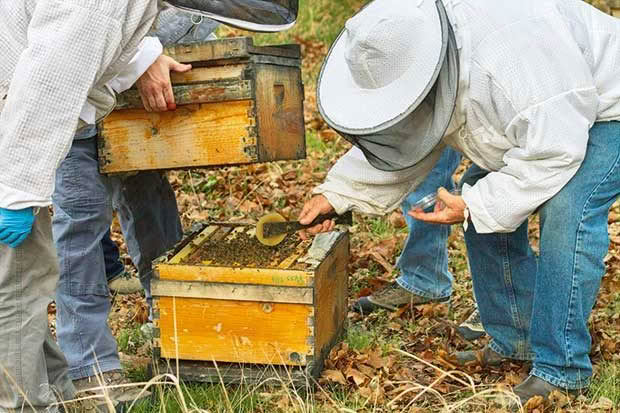Could mushrooms hold the secret to saving bees?

Steve Sheppard and his team placing an edible mushroom extract into a hive as part of their experiment.
A mushroom expert’s observation may help save the world’s bees.
Words Nadene Hall
In 1984, US mycologist Paul Stamets noticed bees flying in and out of a pile of wood chips. The bees were sipping liquid oozing from the mycelium of mushrooms growing on the wood.
He assumed the bees were getting a feed of sugar. But a few years ago, he had a big realization: perhaps the bees were self-medicating.
Thirty-five years after his observation, new research in Scientific Reports – co-authored by Stamets, world bee expert Steve Sheppard, and other scientists – has found feeding a mushroom extract to honeybees dramatically reduces virus levels spread by the varroa mite.
In field trials, colonies fed mycelium extract from amadou and reishi fungi showed a 79-fold reduction in deformed wing virus and a 45,000-fold reduction in Lake Sinai virus compared to control colonies.
“One of the major ways varroa mites hurt bees is by spreading and amplifying viruses. Mites really put stress on the bees’ immune systems, making them more susceptible to viruses that shorten worker bee lifespans,” says Professor Sheppard, a Washington State University entomologist.
“Our greatest hope is that these extracts have such an impact on viruses that they may help varroa mites become an annoyance for bees, rather than causing huge devastation.”
The mycelium extract isn’t currently available for sale, but Stamets says his company, Fungi Perfecti, is ramping up production so they can provide a commercial product.
Professor Sheppard says he and his colleagues plan to do more work to refine their results.
“We aren’t sure if the mycelium is boosting the bees’ immune system or actually fighting the viruses,” he says.
“We’re working to figure that out, along with testing larger groups of colonies to develop best management practices and determine how much extract should be used and when to have the best impact.”
Love this story? Subscribe now!
 This article first appeared in NZ Lifestyle Block Magazine.
This article first appeared in NZ Lifestyle Block Magazine.
